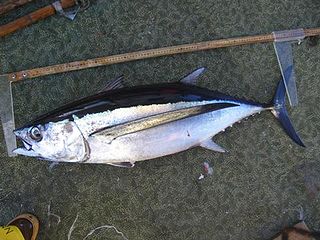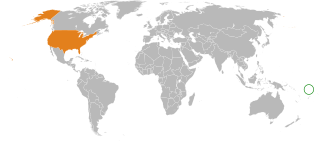
The Marshall Islands, officially the Republic of the Marshall Islands, is an island country west of the International Date Line and north of the equator in the Micronesia region of the Northwestern Pacific Ocean.

A tuna is a saltwater fish that belongs to the tribe Thunnini, a subgrouping of the Scombridae (mackerel) family. The Thunnini comprise 17 species across five genera, the sizes of which vary greatly, ranging from the bullet tuna up to the Atlantic bluefin tuna, which averages 2 m (6.6 ft) and is believed to live up to 50 years.

The albacore, known also as the longfin tuna, is a species of tuna of the order Scombriformes. It is found in temperate and tropical waters across the globe in the epipelagic and mesopelagic zones. There are six distinct stocks known globally in the Atlantic, Pacific, and Indian oceans, as well as the Mediterranean Sea. The albacore has an elongate, fusiform body with a conical snout, large eyes, and remarkably long pectoral fins. Its body is a deep blue dorsally and shades of silvery white ventrally. Individuals can reach up to 1.4 m in length.
From 1916 to 1975, Tuvalu was part of the Gilbert and Ellice Islands colony of the United Kingdom. A referendum was held in 1974 to determine whether the Gilbert Islands and Ellice Islands should each have their own administration. As a consequence of the referendum, the separate British colonies of Kiribati and Tuvalu were formed. Tuvalu became fully independent as a sovereign state within the Commonwealth on 1 October 1978. On 5 September 2000, Tuvalu became the 189th member of the United Nations.
A payao is a traditional fish aggregating device from the Philippines. Payaos are traditionally floating rafts of bamboo anchored to the seafloor, with submerged weighted palm fronds beneath it. They were harvested using handline fishing, surface trolling, or small-scale purse seining. Modern steel payaos use fish lights and fish location sonar to increase yields. While payao fishing is sustainable on a small scale, the large scale, modern applications have been linked to adverse impacts on fish stocks. Payaos have been introduced to fishermen in Vietnam, Thailand, and various countries in Oceania.
Dolphin-safe labels are used to denote compliance with laws or policies designed to minimize dolphin fatalities during fishing for tuna destined for canning.

Tuvalu – United States relations are bilateral relations between Tuvalu and the United States.

The Western and Central Pacific Fisheries Commission (WCPFC) is a regional fisheries management organisation established to conserve and manage tuna and other highly migratory fish stocks across the western and central areas of the Pacific Ocean. Its full name is Commission for the Conservation and Management of Highly Migratory Fish Stocks in the Western and Central Pacific Ocean. It commenced operations in late 2005, and its secretariat is based in Pohnpei, in the northern Pacific state of the Federated States of Micronesia.
The Coordinating Working Party on Fishery Statistics (CWP) provides a mechanism to coordinate fishery statistical programmes of regional fishery bodies and other inter-governmental organizations with a remit for fishery statistics.
The Nauru Agreement Concerning Cooperation in the Management of Fisheries of Common Interest, or The Nauru Agreement is an Oceania subregional agreement between the Federated States of Micronesia, Kiribati, the Marshall Islands, Nauru, Palau, Papua New Guinea, Solomon Islands and Tuvalu. The eight signatories collectively control 25–30% of the world's tuna supply and approximately 60% of the western and central Pacific tuna supply.

The Pacific Islands Forum Fisheries Agency (FFA) is an intergovernmental agency established in 1979 to facilitate regional co-operation and co-ordination on fisheries policies between its member states in order to achieve conservation and optimum utilisation of living marine resources, in particular highly migratory fish stocks, for the benefit of the peoples of the region, in particular the developing countries. The office campus is located in Honiara, Solomon Islands
The Republic of the Marshall Islands has a commercial fishery that targets bigeye and yellowfin tuna using pelagic longline fishing gear. There were 55 longline vessels licensed to fish in the Republic of the Marshall Islands Exclusive Economic Zone (EEZ) in 2011, of which 4 were Marshall Islands-flagged and 51 were foreign-licensed vessels, including 22 Chinese-flagged, 16 Japanese-flagged, 11 Federated States of Micronesia-flagged, and 2 Taiwan-flagged. The Japanese-flagged longliners land their catch in Japan; the other 39 vessels were domestically-based. In 2011, the Marshall Islands longline fleet had reported landings of principal market species of 259 mt of bigeye tuna, 99 mt of yellowfin tuna, 37 mt of blue marlin, 7 mt of black marlin, 4 mt of albacore tuna, and 3 mt of broadbill swordfish. Fresh chilled bigeye and yellowfin tuna is exported primarily to markets in the U.S., China and Canada, and frozen tuna and incidental market species are exported to China and marketed locally.
The Sopoaga Ministry was the 14th ministry of the Government of Tuvalu, led by Prime Minister Enele Sopoaga. It succeeds the Telavi Ministry upon its swearing in by Governor-General Sir Iakoba Italeli on 5 August 2013.
Pamela Maru is a Cook Islands public servant and fisheries management adviser.
PSS Remeliik is a Pacific Forum-class patrol boat, designed and built in Australia, and donated to Palau, to help the nation patrol its exclusive economic zone.

NOAAS Oregon, previously NOAAS Oregon, was an American fisheries research vessel in commission in the National Oceanic and Atmospheric Administration (NOAA) fleet from 1970 to 1980. Prior to her NOAA career, she operated under the United States Fish and Wildlife Service from 1949 to 1970 as US FWS Oregon.

US FWS John R. Manning was an American fisheries research vessel in commission in the fleet of the United States Fish and Wildlife Service from 1950 to 1969. She explored the Pacific Ocean in search of commercially valuable populations of fish and shellfish. After the end of her Fish and Wildlife Service career, she operated as the commercial fishing vessel MV R. B. Hendrickson until she sank in 1979.
Transshipment or transhipment at sea is done by transferring goods such as cargo, personnel, and equipment from one ship to another. It is a common practice in global fisheries and typically takes place between smaller fishing vessels and large specialized refrigerated transport vessels, also referred to as “reefers” that onload catch and deliver supplies if necessary.

Minute Alapati Taupo OBE was a Tuvaluan politician, diplomat, economist and accountant. Taupo was elected to the Parliament of Tuvalu in the 2019 Tuvaluan general election to represent the Nanumanga electorate. He was appointed Deputy Prime Minister & Minister for Fisheries and Trade in the Natano Ministry.
Josie M. Tamate is a Niuean civil servant and former Director-General of the Ministry of Natural Resources of the Government of Niue. In December 2022, she was appointed Chair of the Western and Central Pacific Fisheries Commission (WCPFC), the governing body for the world's largest tuna fishery. Tamate is the first Polynesian to serve as WCPFC Chair.









